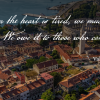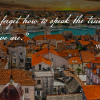
Published: August 31, 2001
View the Original Newsletter: Iskra-90.pdf
About This Issue
Iskra No. 90 opens with one of Valentina Krčmar’s most introspective reflections to date, marking a shift from pure political commentary toward personal and philosophical observation. Written during a period of national fatigue and global uncertainty, it contemplates what it means to stand firm in one’s values when the world feels unsteady.
The issue also includes updates on Croatia’s political scene, notes from the diaspora, medical advice from Dr. Darko Desaty, and cultural features that celebrate resilience, spirituality, and identity.
Editorial: “When Words Lose Their Meaning”
Valentina begins the editorial with a confession of sorts—an exhaustion with political noise and the distortion of truth in public life. She writes that Croatians are living in a time where words are used to manipulate rather than enlighten.
“Once, a man’s word was his honor. Today, it is a tool of convenience, bent and reshaped to fit the moment.”
She reflects on how quickly national unity has splintered since independence, emphasizing that true patriotism cannot exist without honesty and accountability.
“We have learned how to shout, but not how to listen. We have flags and songs, but what of integrity?”
Her tone is weary yet determined—she refuses to let cynicism replace conviction.
“No matter how much politics disappoints us, our duty remains the same: to protect what is good, to speak what is true, and to act with conscience.”
Motrišta: “Between the Past and the Promise”
In her Motrišta column, Valentina reflects on Croatia’s delicate balance between pride in the past and anxiety about the future. She questions whether the promises made in the 1990s have been kept or forgotten amid bureaucracy and corruption.
“The victory we won with courage, we risk losing through indifference.”
She recounts stories from her trip through Croatia earlier that summer—farmers struggling to sell their produce, youth emigrating for better pay, and families who still live with the scars of war.
“Croatia’s beauty is eternal, but its people are tired. They have waited too long for justice and prosperity.”
Despite her criticism, Valentina remains hopeful that a new moral awakening will come through faith and personal responsibility.
“Nations are not saved by governments, but by the conscience of their people.”
National Highlights
The issue reports on key developments in Croatia and the wider region:
-
Economic Outlook: Inflation remains low but growth is stagnant; unemployment still affects nearly 20 percent of the population.
-
The Hague Tribunal: The debate over Croatia’s cooperation with the Tribunal continues, dividing parliament and the public.
-
Education Reform: New proposals aim to modernize the curriculum and improve teacher pay, sparking cautious optimism.
-
Veterans’ Rights: Protests continue over pension cuts and recognition for those who fought in the Homeland War.
-
Tourism Success: The summer season brings record numbers of visitors, offering a rare bright spot in the economy.
Community and Culture
Across Canada, Croatian organizations remain vibrant and united in faith and culture.
-
Mississauga: The Croatian Martyrs Parish celebrated its annual summer picnic, drawing hundreds for traditional music, food, and games.
-
Hamilton: Volunteers launched a community scholarship fund to support Croatian youth pursuing post-secondary education.
-
Ottawa: The Croatian Cultural Society hosted an art exhibition featuring diaspora painters, including works depicting Dalmatian coastlines and Zagreb’s old streets.
Valentina expresses admiration for how the diaspora sustains pride in heritage:
“In every song sung abroad, there is a memory of home. That is how nations survive.”
Health Column: “When Fatigue Speaks”
Dr. Darko Desaty contributes an insightful article about chronic fatigue, identifying its psychological as well as physical roots. He warns that exhaustion often signals deeper emotional strain rather than mere lack of rest.
He outlines practical steps—balanced nutrition, sunlight, exercise, and meaningful social contact—and reminds readers that self-care is not selfish:
“A rested mind is the best medicine against despair.”
Spiritual Reflection: “Faith in Difficult Times”
A short devotional reflection invites readers to look to faith as a stabilizing force amid uncertainty. Quoting Psalm 46, it encourages quiet perseverance:
“Be still and know that I am God.”
Valentina echoes this sentiment, noting that moral renewal begins not in institutions but in individual hearts.
Humor and Light Reading
The humor section, “Smijeh nije grijeh” (“Laughter Is Not a Sin”), offers brief anecdotes poking fun at politics, bureaucracy, and modern habits—reminding readers that laughter is part of resilience.
Closing Thoughts
Valentina ends Iskra No. 90 with a heartfelt appeal:
“Let us keep our eyes open, our hearts soft, and our faith firm. The truth may stumble, but it never falls.”
She signs off simply, as always — with gratitude to her readers and love for her homeland.




